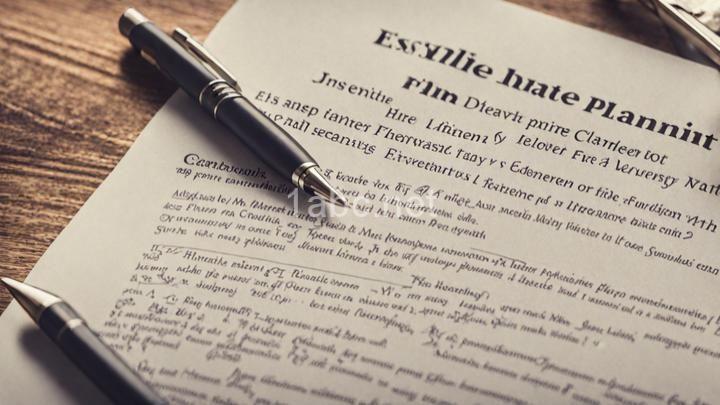Estate Planning for Small Business Owners: Protecting Your Legacy

Introduction:
Hello there, small business owners! Have you ever thought about what will happen to your business and assets once you're no longer around? Estate planning may not be the most exciting topic to discuss, but it is essential for securing your legacy and protecting your loved ones. As your friendly guide, I'm here to help you navigate the complex world of estate planning and shed light on the importance of this process.
I. Understanding the Importance of Estate Planning
Estate planning is not just for the wealthy or elderly; it is crucial for small business owners like yourself. Proper estate planning ensures that your hard-earned assets are protected and that you have a smooth transition plan in place for your loved ones in case of incapacitation or death. By planning ahead, you can avoid potential legal complications and financial burdens that may arise for your family.
II. Assessing Your Assets and Liabilities
To begin planning your estate, it's important to take stock of your business assets, personal assets, and liabilities. Your business assets may include real estate, investments, intellectual property, and more. By understanding your financial situation and the value of your assets, you can determine the best strategies for protecting your legacy and ensuring the smooth transfer of wealth to your beneficiaries.
III. Choosing the Right Estate Planning Tools
A. Wills and Trusts
When it comes to estate planning, two common tools come to mind: wills and trusts. A will is a legal document that specifies how your assets will be distributed after your death. On the other hand, a trust allows you to transfer assets to a designated individual or entity, known as the trustee, who will manage and distribute them according to your instructions.
The choice between a will and a trust depends on your individual circumstances. Wills are generally more straightforward and suitable for smaller estates, while trusts offer more flexibility and can help minimize estate taxes. It's important to consult with an estate planning professional to determine which option is best for you.
B. Power of Attorney and Healthcare Directives
In addition to planning for your assets, it's crucial to consider what will happen if you become incapacitated and are unable to make financial or healthcare decisions. By appointing someone as your power of attorney, you give them the authority to act on your behalf and make financial decisions when you are unable to do so. Healthcare directives, on the other hand, allow you to outline your medical preferences and appoint someone to make healthcare decisions on your behalf.
Choosing the right individuals for these roles is essential. Select trustworthy individuals who understand your values and will act in your best interests. Communicate your wishes clearly and ensure that everyone involved understands their responsibilities.
IV. Protecting Your Business Legacy
A. Succession Planning
As a small business owner, your business is a significant part of your legacy. Creating a succession plan is crucial to ensure the smooth transition of your business to the next generation or a chosen successor. Identify potential successors within or outside the family and provide them with the necessary training and guidance to carry on your business's legacy.
It's important to address potential conflicts that may arise during the transition process. Open communication, clear expectations, and professional guidance can help mitigate these conflicts and ensure a successful handover.
B. Buy-Sell Agreements
Buy-sell agreements are another valuable tool for protecting your business's legacy. These agreements outline what will happen if one owner decides to leave the business, becomes incapacitated, or passes away. They provide a framework for the remaining owners to buy out the departing owner's share and ensure a smooth transfer of ownership.
There are different types of buy-sell agreements, such as cross-purchase agreements and entity-purchase agreements. Each has its advantages, depending on the number of owners and the complexity of the business structure. Working with an experienced attorney can help you design a buy-sell agreement tailored to your specific business needs.
Conclusion:
Congratulations on taking the first step towards securing your business and personal legacy through estate planning! We covered the importance of estate planning for small business owners, assessing your assets and liabilities, choosing the right estate planning tools such as wills and trusts, power of attorney, and healthcare directives. We also discussed protecting your business legacy through succession planning and buy-sell agreements.
Remember, estate planning is not a one-size-fits-all process, and it's essential to seek professional advice from estate planning experts who can tailor a plan to your unique circumstances. By planning ahead, you can ensure that your assets are protected, your loved ones are taken care of, and your business legacy lives on.
If you have any questions or need further assistance, don't hesitate to reach out to a qualified estate planning professional. They are there to guide you through the process and give you peace of mind. Happy planning and securing your legacy!
FREQUENTLY ASKED QUESTIONS
Why is estate planning important for small business owners?
Estate planning is crucial for small business owners for several reasons. Firstly, it helps ensure a smooth transition of assets and business ownership in the event of the owner's death or incapacitation. This is particularly important for small businesses, as their survival may depend on the ability to transfer ownership seamlessly.Secondly, estate planning allows small business owners to minimize estate taxes and other financial obligations. By strategically structuring their assets and business interests, owners can potentially reduce the tax burden on their heirs and preserve the value of their business.
Additionally, estate planning provides a level of protection for both the business and the owner's loved ones. By establishing clear guidelines for how the business should be managed and who should have decision-making authority, owners can ensure that their vision and legacy are upheld. This can prevent disputes and confusion among family members or business partners.
Lastly, estate planning can also include provisions for the owner's personal well-being and healthcare decisions. By appointing a trusted individual to make medical and financial decisions on their behalf, small business owners can have peace of mind knowing that their wishes will be respected if they become incapacitated.
In summary, estate planning is vital for small business owners as it facilitates a smooth transition of assets, minimizes financial obligations, protects the business and loved ones, and ensures personal well-being. Taking the time to engage in proper estate planning can provide peace of mind and help secure the future of both the business and the owner's family.
What key documents are involved in estate planning?
Estate planning involves several key documents that are essential for ensuring your wishes are carried out after your passing. These documents include:
-
Will: A will is a legal document that outlines how you want your assets to be distributed upon your death. It also allows you to name a guardian for any minor children and appoint an executor to handle the administration of your estate.
-
Trust: A trust is a legal arrangement that allows you to transfer assets to a trustee who will manage and distribute them according to your instructions. Trusts can help minimize estate taxes, avoid probate, and provide for the long-term care of your loved ones.
-
Power of Attorney: A power of attorney is a document that grants someone else the authority to make financial decisions on your behalf if you become incapacitated. This person, known as your agent or attorney-in-fact, can handle tasks such as paying bills, managing investments, and making legal decisions.
-
Healthcare Proxy or Medical Power of Attorney: This document allows you to designate someone to make medical decisions for you if you are unable to do so yourself. Your healthcare proxy will have the authority to discuss your medical condition with healthcare professionals and make treatment decisions based on your wishes.
-
Advance Directive or Living Will: An advance directive or living will outlines your preferences for medical treatment, particularly in end-of-life situations. It provides guidance to your healthcare proxy and medical professionals regarding your desires for life-sustaining measures, organ donation, and other medical interventions.
-
Beneficiary Designations: Certain assets, such as life insurance policies, retirement accounts, and payable-on-death bank accounts, allow you to designate beneficiaries. These designations override any instructions in your will, so it is important to review and update them regularly to ensure they align with your wishes.
It is crucial to consult with an estate planning attorney or financial advisor to ensure these documents are properly drafted, executed, and kept up to date. Estate planning is a complex process, and these documents play a vital role in protecting your assets and providing for your loved ones in the future.
How can estate planning help protect my business assets?
Estate planning can be a valuable tool in safeguarding your business assets.
By taking certain steps, you can ensure that your business continues to thrive even after your passing. Here are a few ways estate planning can help protect your business assets:
-
Succession Planning: One crucial aspect of estate planning is determining who will take over your business when you're no longer able to manage it. By appointing a successor and outlining a clear plan for the transition, you can ensure that your business remains in capable hands.
-
Asset Protection: Estate planning allows you to establish legal structures, such as trusts or limited liability companies, to protect your business assets from potential risks or claims. These structures can shield your assets from creditors, lawsuits, or other unforeseen circumstances.
-
Tax Efficiency: Proper estate planning can help minimize the tax burden on your business and ensure that your assets are distributed in a tax-efficient manner. By utilizing strategies like gifting or establishing a charitable trust, you can potentially reduce estate taxes and preserve more of your business wealth.
-
Buy-Sell Agreements: If you have business partners, a buy-sell agreement can be an essential component of your estate plan. This agreement outlines what will happen to your share of the business upon your death or incapacity, ensuring a smooth transition while protecting the interests of all parties involved.
-
Business Continuity: Estate planning allows you to create a comprehensive plan for the continued operation of your business in the event of your absence. This can include provisions for key employees, instructions for business management, and guidelines for decision-making to ensure that your business continues to thrive.
It's important to consult with legal and financial professionals who specialize in estate planning to tailor a strategy that suits your specific business needs. They can guide you through the process, help you understand the legal requirements, and provide personalized advice to protect your business assets effectively.
What happens if I don't have an estate plan?
If you don't have an estate plan in place, there are a few potential consequences that you should be aware of. Without an estate plan, your assets may be distributed according to state laws rather than your personal wishes. This means that your loved ones may not receive the inheritances you intended for them. Additionally, without an estate plan, there may be delays in the distribution of your assets, as the court may need to appoint someone to handle the process. This can result in added stress and expense for your loved ones during an already difficult time. Additionally, if you have minor children, an estate plan is crucial for appointing guardians and ensuring their well-being. Overall, having an estate plan in place allows you to have control over the distribution of your assets and provide for your loved ones according to your wishes, so it's important to consider creating one. If you need assistance with creating an estate plan, I'm here to help.




